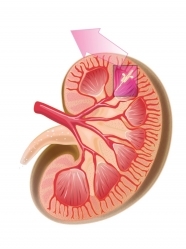The Quest to Treat Diabetic Kidney Disease

Welcome to trial watch, where we keep an eye on the latest and greatest trials going on in the field of diabetes. Here, you can learn about new therapies and devices currently under study, and learn more about participating in these trials. Trial participants can get early access to new treatments, receive care at clinical trial centers, and are usually compensated for their time. You can read more about clinical trials at the “Center Watch” volunteer page or the ClinicalTrials.Gov information page.
Clinical Trial Identifier: NCT01858532
Trial name: SONAR (Study of Diabetic Nephropathy with Atrasentan)
Diabetes type: Type 2 diabetes.
What it’s testing: The trial is testing a new drug (pill) to prevent diabetic kidney disease called Atrasentan. Atrasentan is an investigational drug that blocks the effects of a peptide called Endothelin-I, which constricts blood vessels in the kidney and causes damage to them.
Why this is new/important: There are no drugs currently available to prevent diabetic kidney disease. This trial hopes to see if Atrasentan can stop disease progression.
What does the trial hope to find? The primary outcome of the study is the onset of end stage renal disease or the doubling of creatinine levels (lower levels are an indication of healthy kidney function). The study will also observe Atrasentan’s effects on heart disease, glomerular filtration rate (or GFR, a test used to check how well the kidneys are working – you can learn more in our learning curve here), and quality of life.
Trial Length: Four years.
Trial Location: 759 locations worldwide, including locations in over 40 states in the US.
Do you qualify? To qualify for this study, you must have type 2 diabetes, an A1c below 12%, an estimated GFR between 25 and 75 mL/min/1.73 m2 (this means you would have existing kidney impairment, although it could be mild - you may have to ask your doctor if you don’t know your GFR), and other criteria. Exclusion criteria include a history of severe peripheral edema, pulmonary edema, and facial edema, a history of pulmonary hypertension requiring oxygen therapy, and a history of heart disease, among other criteria. A full list of the inclusion and exclusion criteria can be found at the clinicaltrials.gov site.
Where to get more information: For more information about the trial and its enrollment, you can contact Blai Coll (847-937-6156, [email protected]) or Renee Heuser (847-938-5887, [email protected], or visit its posting on the clinicaltrials.gov website.







